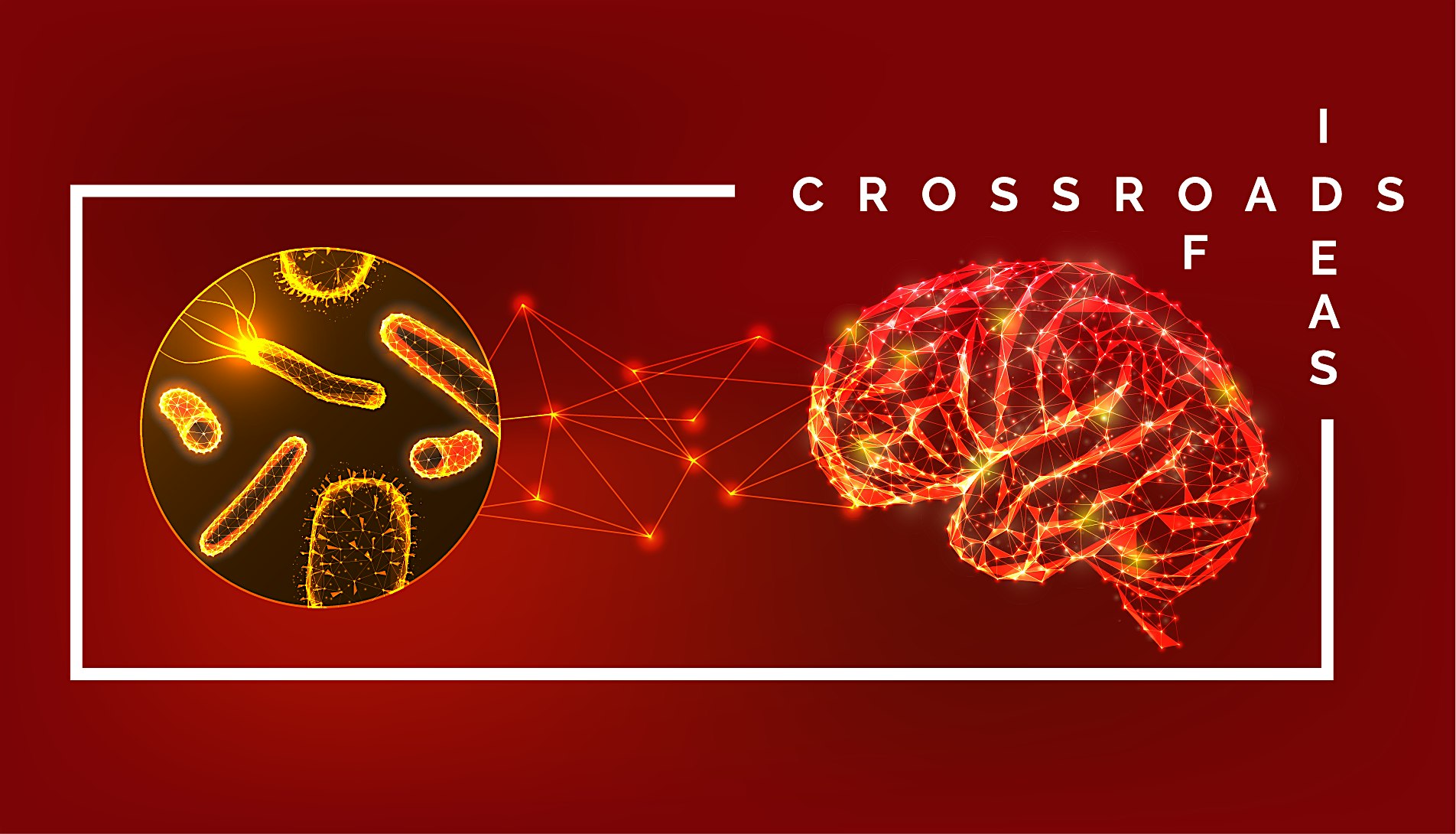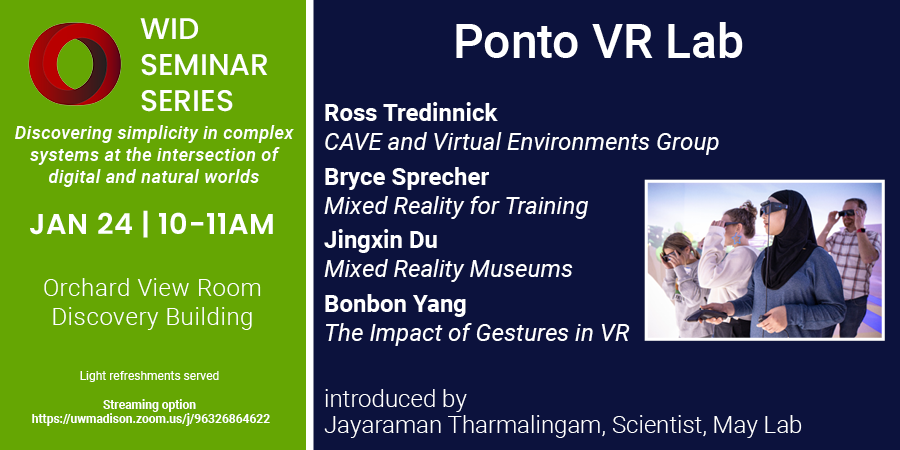ML+X Forum: Applied Machine Learning
Orchard View Room, Discovery Building (Also offered online)Machine Learning Beyond Traditional CS Fields. CONTACT: endemann@wisc.edu ONLINE: https://uwmadison.zoom.us/j/92639425571?pwd=Z0tCaWZxK0dDcWs2dm51dXZpcy9mQT09
ML+Coffee
Discovery Building 330 North Orchard Street, De Luca Forum, Madison, WI, United StatesMachine Learning Community Event. CONTACT: endemann@wisc.edu
WID Seminar Series: Yin Lab
3rd Floor Orchard View Room, Discovery Building (Also offered online)Molecular information processing: from COVID to the chemical origins of life. Featuring: Nan Jiang, PhD candidate in Biophysics, Chung-Hui Hsu, PhD Candidate in Chemical and Biological Engineering, and Dr. John Yin. Special introduction by Dr. Tim Rogers, Psychology. Light refreshments will be served and an online option is available. ONLINE: https://uwmadison.zoom.us/j/96326864622
Software Carpentry
Learn Skills for Research Software Engineering. Software Carpentry aims to help researchers get their work done in less time and with less pain by teaching them basic research computing skills. This hands-on workshop will cover basic concepts and tools, including program design, version control, data management, and task automation. Participants will be encouraged to help one another and to apply what they have learned to their own research problems. CONTACT: facilitator@datascience.wisc.edu URL: https://uw-madison-datascience.github.io/2025-01-13-uwmadison-swc/
Software Carpentry
https://uw-madison-datascience.github.io/2025-01-13-uwmadison-swc/
Software Carpentry
Learn Skills for Research Software Engineering. Software Carpentry aims to help researchers get their work done in less time and with less pain by teaching them basic research computing skills. This hands-on workshop will cover basic concepts and tools, including program design, version control, data management, and task automation. Participants will be encouraged to help one another and to apply what they have learned to their own research problems. CONTACT: facilitator@datascience.wisc.edu URL: https://uw-madison-datascience.github.io/2025-01-13-uwmadison-swc/
Software Carpentry
Learn Skills for Research Software Engineering. Software Carpentry aims to help researchers get their work done in less time and with less pain by teaching them basic research computing skills. This hands-on workshop will cover basic concepts and tools, including program design, version control, data management, and task automation. Participants will be encouraged to help one another and to apply what they have learned to their own research problems. CONTACT: facilitator@datascience.wisc.edu URL: https://uw-madison-datascience.github.io/2025-01-13-uwmadison-swc/
Software Carpentry
Learn Skills for Research Software Engineering. Software Carpentry aims to help researchers get their work done in less time and with less pain by teaching them basic research computing skills. This hands-on workshop will cover basic concepts and tools, including program design, version control, data management, and task automation. Participants will be encouraged to help one another and to apply what they have learned to their own research problems. CONTACT: facilitator@datascience.wisc.edu URL: https://uw-madison-datascience.github.io/2025-01-13-uwmadison-swc/
Crossroads of Ideas: Gut Instincts – Microbes, Addiction, and Immunity
Discovery Building or streaming at https://uwmadison.zoom.us/j/95175400747 330 North Orchard Street, Madison, WI, United StatesPart 1 of the Microbiome Miniseries, with Margaret Alexander and Vanessa SperandioKick off an exciting three-part mini-series on the gut-brain superhighway with UW-Madison researchers Vanessa Sperandio and Maggie Rose Alexander. In this thought-provoking conversation, they will unpack the complex interplay between gut microbes, addiction, and immunity, sharing cutting-edge research and visionary perspectives on how these connections shape the future of brain and gut health in society.Margaret Alexander is an Assistant Professor at the University of Wisconsin Madison in the department of Medical Microbiology and Immunology. Dr. Alexander’s research is focused on understanding the mechanistic interactions between diet, the microbiota, and immune [...]
Health Sciences Data Carpentry
3330 Health Sciences Learning CenterFundamental Data Skills Workshop. Data Carpentry develops and teaches workshops on the fundamental data skills needed to conduct research. Its target audience is researchers who have little to no prior computational experience, and its lessons are domain specific, building on learners’ existing knowledge to enable them to quickly apply skills learned to their own research. Participants will be encouraged to help one another and to apply what they have learned to their own research problems. CONTACT: facilitator@datascience.wisc.edu URL: https://uw-madison-datascience.github.io/2025-01-21-uwmadison-dc/
Health Sciences Data Carpentry
3330 Health Sciences Learning CenterFundamental Data Skills Workshop. Data Carpentry develops and teaches workshops on the fundamental data skills needed to conduct research. Its target audience is researchers who have little to no prior computational experience, and its lessons are domain specific, building on learners’ existing knowledge to enable them to quickly apply skills learned to their own research. Participants will be encouraged to help one another and to apply what they have learned to their own research problems. CONTACT: facilitator@datascience.wisc.edu URL: https://uw-madison-datascience.github.io/2025-01-21-uwmadison-dc/
Health Sciences Data Carpentry
3330 Health Sciences Learning CenterFundamental Data Skills Workshop. Data Carpentry develops and teaches workshops on the fundamental data skills needed to conduct research. Its target audience is researchers who have little to no prior computational experience, and its lessons are domain specific, building on learners’ existing knowledge to enable them to quickly apply skills learned to their own research. Participants will be encouraged to help one another and to apply what they have learned to their own research problems. CONTACT: facilitator@datascience.wisc.edu URL: https://uw-madison-datascience.github.io/2025-01-21-uwmadison-dc/
Research Cyberinfrastructure Community of Practice meeting (FREE and Online)
(Online)Learn about tools and services to support campus research.. Researchers and IT/support staff are invited to participate in this monthly community of practice, which features presentations and support related to campus research tools/services. This month: RCI Tools & Services Overview - Learn about tools available through the Research Cyberinfrastructure, including ResearchDrive, Research Object Storage (S3), Electronic Lab Notebook, Globus, Data Science Platform, and cloud computing. RCI staff available for consultations during this session! CONTACT: rci@g-groups.wisc.edu URL: https://go.wisc.edu/rci ONLINE: https://uwmadison.zoom.us/j/98069906780?pwd=WK87lTIKXV1hv2hqQu7QPW0DNiYWA8.1
Health Sciences Data Carpentry
3330 Health Sciences Learning CenterFundamental Data Skills Workshop. Data Carpentry develops and teaches workshops on the fundamental data skills needed to conduct research. Its target audience is researchers who have little to no prior computational experience, and its lessons are domain specific, building on learners’ existing knowledge to enable them to quickly apply skills learned to their own research. Participants will be encouraged to help one another and to apply what they have learned to their own research problems. CONTACT: facilitator@datascience.wisc.edu URL: https://uw-madison-datascience.github.io/2025-01-21-uwmadison-dc/
WID Seminar Series: Ponto VR Lab
3rd Floor Orchard View Room, Discovery Building (Also offered online)Discovering simplicity in complex systems at the intersection of digital and natural worlds. WID Seminar Series: Ponto VR Lab January 24, 2025 10:00 AM Orchard View Room Introduction by: Jayaraman Tharmalingam, Scientist, May Lab Featuring: Ross Tredinnick - CAVE and Virtual Environments Group Bryce Sprecher - Mixed Reality for Training Jingxin Du - Mixed Reality Museums Bonbon Yang - The Impact of Gestures in VR CONTACT: 316-4511, lredeagle@wisc.edu ONLINE: https://uwmadison.zoom.us/j/96326864622




